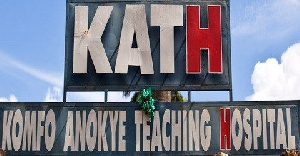Professor Baffour Opoku, Acting Chief Executive of the Komfo Anokye Teaching Hospital (KATH) in Kumasi, has said there is the need for the country to train more medical oncologists to help manage the rising incidence of cancers in the country.
He said the limited number of oncologists was seriously affecting the management and treatment of cancers which was now becoming a huge national health burden.
Speaking at the national ceremony to mark this year’s World Cancer Day in Kumasi, Professor Opoku, said KATH has already taken initial steps to address shortages of oncology professionals at the facility.
He said the hospital was collaborating with the Ghana College of Physicians and Surgeons to train oncologists at the membership level in general oncology as well as fellows in sub-specialty areas.
Currently the hospital admits two fellows every year for training in gynae-oncology, and an equal number in general and paediatric oncology.
“The hospital is also in the concluding stages of partnership with some pharmaceutical companies to ensure the regular supply of cancer drugs at relatively cheaper prices for patients”, he told the participants.
Professor Opoku said the problem of shortage of medical oncologists at the facility was being seriously addressed to promote better administration of chemotherapy and other treatment regimens for patients.
Among the key personalities, who graced the commemoration of the Day included, the President of the Union for International Cancer Control (UICC), Princess Dina Mired, as well as Ghana’s First Lady, Mrs. Rebecca Akufo-Addo, and Lady Julia, wife of the Asantehene, Otumfuo Osei Tutu II.
Kumasi, the nation’s second largest city, has been selected by the Union, the global largest cancer-fighting organization, as one of its centres to participate in the ‘City Cancer Challenge Project’.
This makes Ghana the only African country to be listed amongst the comity of nations committed to campaigning against the scourge of cancers.
Prof. Opoku, giving a situational report on the incidence of cancer cases in the metropolis, said the KATH Oncology Directorate sees an average of 850 new cancer cases every year.
According to the Kumasi Cancer Registry of 2015, the leading cancers seen are liver and prostate in males, breast and cervix in females and Non-Hodgkin’s lymphomas and leukaemia in children.
“The worry is that many adults with cancer present them rather late,” Prof Opoku said, adding that, that was due to the lack of education on recognizing early symptoms, self-medication and poverty in seeking for treatment.
The acting KATH Chief Executive said the fight against cancer “cannot be won without preventive measures”.
It was, therefore, the duty of stakeholders to invest in systems and structures needed to make it possible for effective cancer-fighting campaigns in the country.
Health News of Thursday, 7 February 2019
Source: ghananewsagency.org













